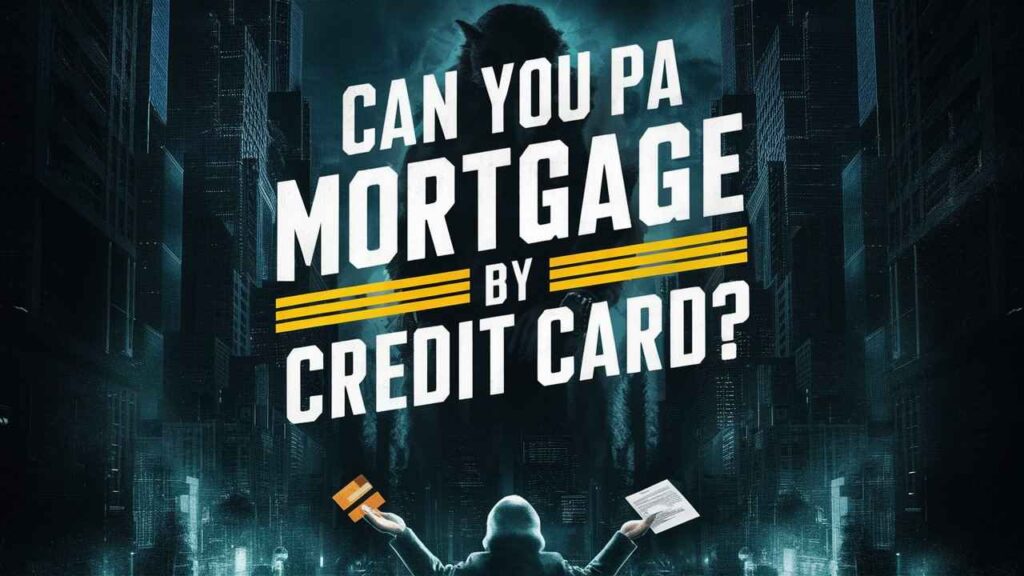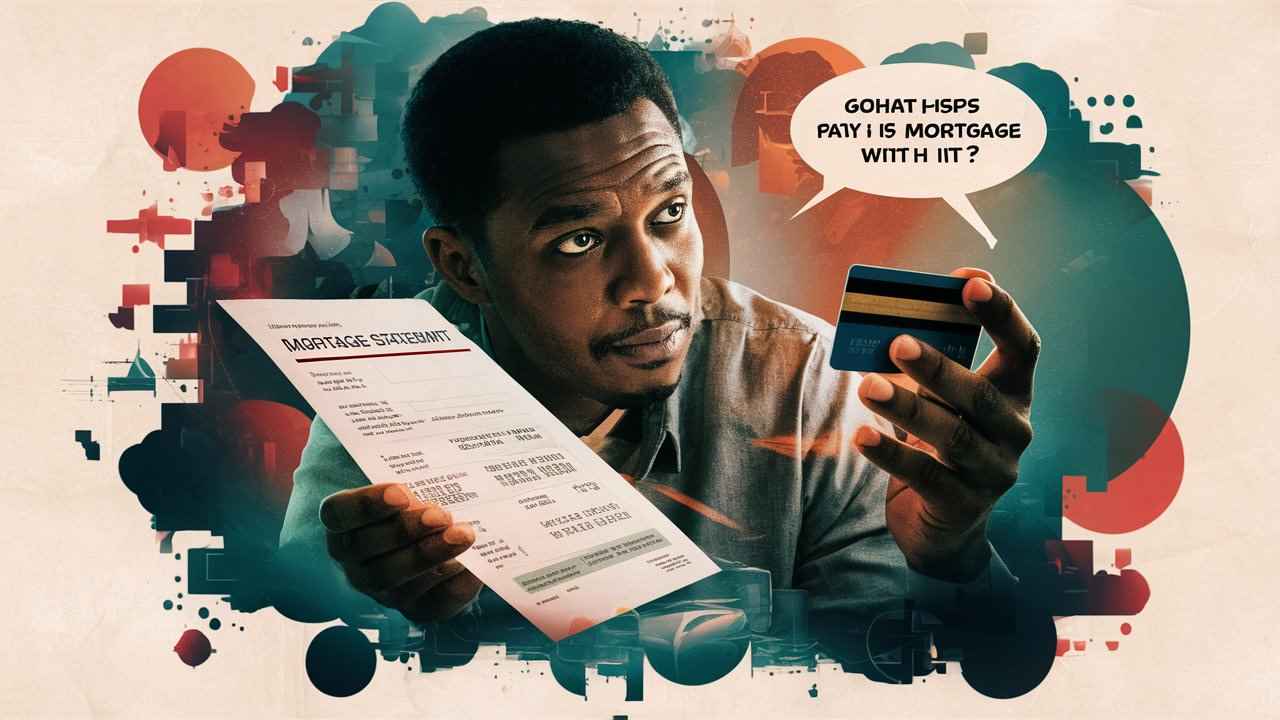Why Paying a Mortgage with a Credit Card Sounds Tempting
Imagine racking up credit card rewards just by paying your mortgage🏡a big expense you have to cover every month anyway. Earning cashback, racking up travel miles, or hitting that welcome bonus threshold sounds irresistible, right? The lure of squeezing every ounce of benefit from your spending has many people thinking: Can you really pay mortgage by credit card?

The Reality Check: Can You Really Do It?
While the idea sounds promising, reality delivers a bit of a blow. Mortgage lenders generally don’t allow direct credit card payments. But that hasn’t stopped homeowners from hunting for alternative ways to make it happen. There are workarounds, but it’s essential to know why mortgage lenders shy away from the whole “credit card payment” scheme and whether the effort is actually worth it.
Why This Idea Has People So Curious
For one, it seems like a clever financial hack. Then there’s the allure of the rewards🏡credit card companies dangle points, miles, and bonuses like candy. Plus, in times of financial strain, having options for how to pay your mortgage can feel comforting. But, as with most things that sound too good to be true, there are some significant pitfalls you should consider.

The Basics: How Mortgages and Credit Cards Work
Understanding Mortgage Payments: Principal, Interest, and All That Jazz
Mortgage payments cover more than just the loan’s principal; they typically include interest, property taxes, and insurance too. These complex parts make mortgage payments different from typical bills and more challenging to shuffle around.
How Credit Cards Handle Payments: Rewards, Fees, and Interest Rates
Credit cards, on the other hand, operate on a system designed to make the banks money. Yes, they offer rewards, but they also charge fees and interest that can rapidly inflate if payments aren’t handled responsibly. Rewards are tempting, but understanding the associated costs is crucial before considering credit card payments for a mortgage.
Why Most Mortgage Lenders Don’t Accept Credit Cards
Mortgage lenders don’t typically accept credit card payments because they want direct, secure funds. Additionally, processing fees from credit card transactions make them unappealing. After all, mortgage companies are in the business of loaning money🏡not paying fees to credit card networks.

Why Would You Want to Pay Mortgage by Credit Card?
The Appeal of Earning Rewards and Points
Paying large amounts on your credit card can mean significant rewards. If you’re chasing a cashback milestone or a hefty travel reward, making a big payment can help you hit those goals faster.
Leveraging Introductory Offers: Cash Back and Low-Interest Rates
Introductory offers like 0% APR can also tempt homeowners into paying mortgage by credit card. This approach allows them to manage cash flow while avoiding interest, at least temporarily.
Handling a Cash Crunch: When You’re Short on Mortgage Funds
Sometimes, credit cards feel like a financial lifeline in a tight spot. If you’re facing an unexpected cash crunch, a credit card can cover the mortgage payment temporarily, helping you avoid late fees or missed payments.

The Catch: What Are the Downsides?
Processing Fees: Why They Can Cancel Out the Rewards
The third-party payment processors that make it possible to pay a mortgage by credit card often charge fees🏡often in the 2-3% range. These fees can easily overshadow any rewards you might earn, making this option more costly than it appears.
Credit Card Interest Rates vs. Mortgage Interest Rates
The interest rate on a credit card is typically much higher than a mortgage rate. If you’re unable to pay off the balance in full, the high-interest charges can quickly turn this strategy into an expensive mistake.
Risks to Your Credit Score: Utilization Rates and Potential Debt
Using a credit card for such a significant payment can increase your utilization ratio, which can impact your credit score. Additionally, the risk of carrying high debt on your credit card could affect future credit applications.

Ways to Pay Your Mortgage by Credit Card (Indirectly)
Using Third-Party Payment Services: How It Works
Third-party services like Plastiq allow you to use a credit card to pay a mortgage, for a fee. These services act as middlemen, charging your card and sending a check to your mortgage lender.
Cash Advances: Is This a Good Idea?
Cash advances are another option but generally come with high fees and interest from day one, making them an expensive route for covering mortgage payments.
Balance Transfer Checks: The Unexpected Solution
Some credit card companies issue balance transfer checks, which allow you to write a check against your credit card balance. This can be a way to cover a mortgage payment, but it requires careful handling to avoid spiraling into debt.

Exploring Third-Party Services Like Plastiq
How Plastiq and Similar Services Process Your Payment
Plastiq and similar services process payments by charging your credit card and issuing funds to your mortgage lender. This makes it possible but not necessarily affordable.
Fees, Rules, and Fine Print: What You Need to Know
Each third-party service has its own rules, fees, and policies. It’s essential to read the fine print and understand the costs involved before committing.
Is It Worth the Cost? Breaking Down When It Makes Sense
In some cases, especially if you’re close to earning a big reward or facing a temporary cash crunch, using a third-party service can be worthwhile. But be aware of the costs to ensure it doesn’t outweigh the potential benefits.
Pros and Cons of Using a Credit Card for Mortgage Payments
The Rewards: Points, Miles, and Cash Back Potential
The upside is, of course, the rewards potential. Those points and miles can add up, especially if you’re using a credit card with generous perks.
Potential Drawbacks: Fees, Interest, and Credit Score Impact
The downsides, however, can overshadow the rewards. Fees and high-interest rates are standard pitfalls, and using a credit card for such a large expense can hurt your credit score if not managed wisely.
When the Pros Outweigh the Cons🏡and When They Don’t
If you can cover the balance quickly and the rewards are substantial, it might be worth it. But if fees and potential interest threaten to cut into your financial security, it’s better to look at alternative payment methods.
Credit Card Promotions: Can You Game the System?
Welcome Bonuses: How to Use Them Wisely
Welcome bonuses offer enticing rewards for hitting a spending target. Using your credit card for mortgage payments could help you reach this threshold, but only if you can manage the balance.
Avoiding Interest with 0% APR Offers
A 0% APR offer can make paying a mortgage with a credit card feasible. Just make sure to pay off the balance before the promotional period ends to avoid interest.
The Art of Timing: Getting the Most Out of Promotional Periods
Timing is key to maximizing any introductory offer. Plan payments strategically to take full advantage of any low or 0% APR periods, which can help you avoid unnecessary interest.
Final Verdict: Is Paying Your Mortgage by Credit Card Worth It?
Weighing the Pros and Cons for Different Scenarios
In rare situations, paying a mortgage with a credit card might make sense, but it’s rarely a good long-term strategy. High fees, potential interest, and credit score risks make it an option best reserved for strategic, short-term use.
When It’s a Smart Financial Move🏡and When It’s Not
If you’re after a reward and know you can pay off the balance, go ahead🏡but with caution. In most cases, though, traditional payments or alternative methods are likely safer and more cost-effective.
Final Tips for Those Who Want to Give It a Try
If you’re set on trying this method, stay organized. Set up alerts, calculate the potential costs, and create a repayment plan. Know the stakes, manage the risks, and use credit strategically to avoid unintended financial strain.
Conclusion
Paying Mortgage with Credit Card: A Trend or a Trap?
Using a credit card to pay a mortgage sounds clever but is risky business. While it might work as a one-off tactic, it’s rarely a sustainable choice. Fees, interest, and credit score impacts can easily outweigh the perks.
Key Takeaways for the Adventurous Homeowner
Stay aware of the costs, be realistic about your finances, and weigh the pros and cons. This strategy isn’t for the faint-hearted, but with careful handling, it’s possible to make it work🏡at least for a reward or two.
Where to Go from Here: Planning for Future Payments
Consider other backup plans, such as building an emergency fund or exploring a HELOC, before relying on credit cards for recurring expenses. And remember: financial stability is often built on consistency, not clever hacks.
People Also Ask
Can I pay my mortgage with a credit card to earn points?
Using a credit card to pay your mortgage can indeed earn points, but it usually requires third-party services, which often charge fees. These fees can sometimes cancel out any points or rewards earned, so make sure to do the math before proceeding.
Can I use my credit card to pay a loan?
Most loans🏡like personal loans or car loans🏡don’t accept credit card payments directly. However, you may be able to pay through a third-party payment service or by using balance transfer checks, although both methods come with fees and potential risks.
Can I use a credit card to pay a mortgage deposit?
Mortgage deposits generally require direct funds, so credit cards aren’t usually an option. Lenders often require deposits to come from a savings account or other verified funds.
What bills can I not pay with a credit card?
Certain bills, including mortgages and car payments, often cannot be paid directly with a credit card. Additionally, some utilities and rent payments may not accept credit card payments without third-party processors, which can add fees.
Can I pay my mortgage with a credit card in the UK?
In the UK, paying a mortgage with a credit card isn’t usually an option, as most lenders won’t accept credit card payments. However, you may be able to use a third-party service, though this approach often comes with fees.
Is it better to pay credit card or mortgage?
When prioritizing debt, it’s generally better to pay down credit card balances first, as they typically have higher interest rates than mortgages. However, consistently paying your mortgage on time is crucial to avoid foreclosure.
Can I make a car payment with a credit card?
Most car loan providers don’t allow credit card payments directly. Using a third-party service might work, but high fees can make this approach costly.
How do you pay your mortgage?
Typically, mortgage payments are made via bank transfer, ACH (Automated Clearing House) payment, or by check. Some lenders allow direct debit payments for added convenience.
Can mortgage be paid with debit card?
Yes, many lenders accept debit card payments for mortgages, allowing funds to transfer directly from your bank account without the high fees associated with credit card payments.
How many points can you pay on mortgage?
Using a credit card to pay a mortgage can earn you reward points, but this depends on the amount and the rewards rate of your credit card. Always weigh the rewards against any fees.
Does a mortgage payment affect credit score?
Yes, paying a mortgage on time positively impacts your credit score, while late payments can hurt it. Consistent, timely payments contribute to a healthy credit profile.
Is it a good idea to pay all your bills with a credit card?
Paying bills with a credit card can help earn rewards and consolidate payments, but it’s essential to pay off the balance in full each month. Otherwise, high interest rates can outweigh the benefits.
Why can’t I pay my mortgage with a credit card?
Mortgage lenders avoid credit card payments due to processing fees and the risk of borrower debt accumulation. They prefer direct, more secure payment methods like ACH or direct debit.
Is it possible to pay off mortgage with credit card?
Yes, you could theoretically pay off a mortgage with a credit card by using balance transfer checks or cash advances. However, these options come with high fees and interest rates, making them less practical.
Can you pay a mortgage off early?
Yes, most lenders allow you to pay off a mortgage early. Some may charge a prepayment penalty, so check with your lender before making extra payments.
Can you pay your mortgage with a credit card in the UK?
While it’s generally not possible to pay a mortgage directly with a credit card in the UK, some homeowners use third-party services, though this adds fees.
Can I pay my rent with a credit card?
Yes, many landlords accept credit card payments through third-party services like Plastiq or PayPal. Just keep in mind that processing fees may apply.
Can I use my Capital One credit card to pay my mortgage?
Capital One and other credit cards generally can’t be used directly for mortgage payments. You’d need to use a third-party payment service, which usually involves a fee.
Can we use credit card to pay home loan?
Paying a home loan with a credit card isn’t generally possible directly. However, third-party payment services can facilitate this, though fees may make it cost-prohibitive.
Can I use my credit card to pay a bill?
Yes, credit cards are widely accepted for many bills, including utilities, cell phone, and cable bills. Just ensure you can pay the balance in full to avoid interest charges.
Can credit cards be used for loans?
Credit cards can indirectly be used to cover loan payments through cash advances or balance transfer checks, though both options come with fees and high interest rates.
Can I borrow money with my credit card?
Yes, a credit card allows cash advances, which effectively borrow against your credit limit. Be cautious, as cash advances come with high fees and immediate interest charges.
Can you get a credit card to pay off debt?
Yes, some people use balance transfer credit cards to consolidate and pay off debt. These cards often offer low or 0% introductory APR periods, which can help reduce interest if managed responsibly.








